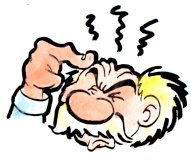Some companies are eager to patent every innovation made by their engineers, or anybody who works for them.
In other companies, the culture can be more closed. For example, there are a few engineers who are expected to invent stuff, and when they talk, people listen. But if anybody else invents something, nobody listens. Or, somebody will politely listen for a few minutes, and reply that it will never work and he doesn't understand it anyway (note the order!).
Not every company suffers from NIH, of course, but still it can be difficult for an unsuspected inventor to be heard. She or he talks with a trusted coworker, who is supposedly knowledgeable, and the answer is still the same. It will never work.
Won't it?

So if the first reaction is, it is never going to work, that doesn't necessarily mean that it will never work. In the majority of cases it just means I don't understand what you envision.
It should actually be encouraging if people respond this way. An invention that is obvious would probably be easy to understand. But, an obvious invention is not patentable (at least, not in the US, and many countries have similar laws). So if an invention is hard to figure out, it might be because it is not obvious at all. This greatly increases the chances of getting your patent awarded.
Earlier in this series (TPS09) I wrote about the CTO who cannot explain his invention. This is more common than you might think. Inventors in academia are usually very good in explaining their invention, because their job is to teach people who don't already know everything. Inventors outside academia often have not been trained in explaining. They might even assume that it is good enough if only another expert understands them. When they document something, they sometimes forget the golden rule of technical writing: make sure that a recent college graduate can understand it. Inventors in the industry often forget how much expertise they have that other engineers (with other expertise) don't have. They use terms whose definitions are not widely known. They talk about systems they incorrectly believe everybody already knows, so there should be no reason to define or explain. And often, they tell what they do, but not why, or how it makes a difference.
But there is also that they see solutions where other people see limitations. And this could be your case, too. Say, you've invented the electronics equivalent of a passenger plane full of bunk beds, so that people can actually sleep during overnight flights. You may see in your mind's eye how an airline can arrange sufficient beds so that coach class can hold 30% more passengers, and they rest 100% better. Your trusted colleague, to whom you explain the invention, thinks that sleeping might be nice, but you can't eat in a bed, so you can't have your so much beloved airplane meal, and thus it is never going to work. He may reject your idea without further elaborating, or he may even say that the meal will be a problem. If he does, you can respond that you had already thought about that, and decided that the airline could provide people a meal in the waiting time between check in and boarding. This meal could even be better than the onboard meals, and people could be sleepy by the time they get on board.
Your coworker grunts, but isn't convinced yet. He feels there are more problems. He is still thinking about what those other problems could be. He will let you know (once he starts taking your idea seriously, which could be never). Does he have NIH? Maybe not, but he doesn't have your experience and background either, and he may not have the imagination that you have. Sometimes it takes a long discussion to explain why a simple idea might actually work. And sometimes it means that you have to check with experts of varying background to find out if different aspects (parts) of your invention all work.
As a patent agent, my job is to get inventors to explain their invention fully to me. I can get access to them for a couple of hours, in some cases a couple of times. Even if they can explain their invention well, I may have to get myself to a level at which I have sufficient background information to understand what they tell me. This takes time that I need to invest. For chip inventions I budget up to 10 hours. Your coworker probably needs less time since he has more background, but you shouldn't be surprised if it would still take him several hours, and an extensive discussion with you to elaborate all barriers that he had in mind for which you already see solutions.
In any case, if your invention is not obvious, be prepared that people may reject it at first. If your invention is truly ingenious, expect that it may take quite some time before people start to understand it. Didn't it take some five years after publication until finally somebody understood Einstein's relativity theory?


